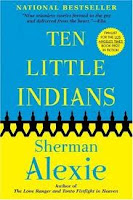So, here are five titles I’m looking forward to in 2011, in order of their release:
Update: Here are the titles to look forward to for the last six months of 2011
Bird Cloud by Annie Proulx (January 4)
If there’s any American that writes place better than Proulx, I’d like to read them. The Shipping News, Bad Dirt, and Open Range are all masterly evocations of setting. Bird Cloud is actually a memoir of Proulx’s years in Montana, and I am fascinated to see her turn her prodigious gifts on her own life, which is somewhat of a mystery (a recent Literary Fact of the Day: she and her four sisters had not been in the same room for forty years before they were reunited for their father’s funeral). I generally avoid memoirs, but I will have to tune in here for the sentences. My god, the sentences.
West of Here by Jonathan Evison (February 15)
I’m succumbing to hype a little bit here. Evison’s last novel, All About Lulu, was pretty good, about par for the kinds of books I read. Normally, this kind of experience would lead me to wait for some post-release chatter before picking up his next one, but I’ve heard some pretty serious superlatives thrown about for West of Here. This, combined with a setting and plot that scratch one of my itches (frontier narratives), has my active sonar pinging pretty loudly.
All the Time in the World: New and Selected Stories by E.L. Doctorow (March 22, 2011)
I read everything Doctorow writes. I’ve said before that while I love Roth, I do think Doctorow is actually the leading candidate to be the next American to win the Nobel. His historical range is absolutely stunning: The March, Billy Bathgate, Ragtime, and on and on. That said, he is still somehow underrated as a short story writer: I adored Sweet Land Stories and look forward to this collection. (As an aside, Homer & Langley didn’t get a lot of praise, but what an attempt. I actually think it is best thought of as a fantastic short story that is just 150 pages too long).
Curfew by Jesse Ball (June 14)
UPDATE: Here's my review. (This turned out to be a truly great novel)
Poet Jesse Ball’s debut novel, The Way Through Doors, was one of my favorite books of 2009. Inventive, playful, and vertiginous, the book was part MC Escher, part Italo Calvino. I don’t know much about Curfew at this point, except that it is about a father and a daughter and something happens to the father. It doesn’t matter—I’m already sold.
The Pale King by David Foster Wallace (?)
Does it really matter what the plot is? Actually, here guess (answer at the end of the post):
A) A band of sentient monkeys descends from Mount Kilimanjaro with evidence of extra-terrestrial life. Mistaking a group of Midwesterners on a safari for the leaders of humanity, they impart the secrets of the universe before vanishing into the ether. The tour group, mistaking the encounter for an act of French cultural terrorism, shrug s it off.
B) A character named David Foster Wallace takes a job at the IRS where the work is so mind-numbing that all employees undergo boredom survival training. Wallace finds himself fascinating with his co-workers bizarre psychology and uncovers a plot by the IRS to make working conditions even more onerous.
C) The Pale King is actually the altered text of David Foster Wallace’s favorite book, The Street of Crocodiles. Meticulously cutting words out of every page thereby exposing words on subsequent pages, Wallace transforms a signature work into a textual-sculptural masterpiece of reinvention and homage. The book will only be published in England in limited quantities on archival paper and cost 40 bucks for the paperback.
That's mine---anything else I should be looking forward to?
You should also check out 2011 Anticipated Lists from Greg at The New Dork Review of Books and Michele at Read and Breathe. Thanks to Rachel at A Home Between the Pages for some research help.
And the correct plot for The Pale King is (B). (C) actually describes Jonathan Safran Foer's new book, Tree of Codes. (A) is a fabricated novel plot. Did the monkeys give it away?
___________________________________________________________________________________________
Buy books mentioned in this post (or anything else, actually) using the below links, and The Reading Ape gets a small referral fee to defray our nominal operating costs.





















